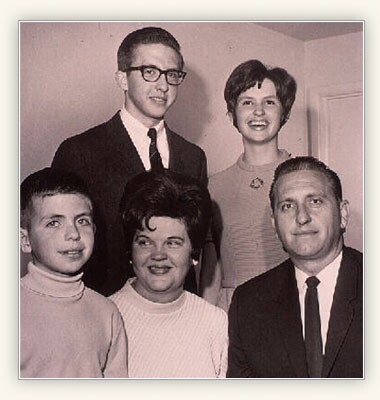
Monson family photo. Photo from LDS.org.
Thomas S. Monson
President of The Church of Jesus Christ of Latter-day Saints
A funny story from young fatherhood, from "Peace, Be Still":
Brethren, there is one responsibility that no man can evade. That is the effect of personal influence.
Our influence is surely felt in our respective families. Sometimes we fathers forget that once we, too, were boys, and boys at times can be vexing to parents.
I recall how much, as a youngster, I liked dogs. One day I took my wagon and placed a wooden orange crate in it and went looking for dogs. At that time dogs were everywhere to be found: at school, walking along the sidewalks, or exploring vacant lots, of which there were many. As I would find a dog and capture it, I placed it in the crate, took it home, locked it in the coal shed, and turned the latch on the door. That day I think I brought home six dogs of varying sizes and made them my prisoners after this fashion. I had no idea what I would do with all those dogs, so I didn’t reveal my deed to anyone.
Dad came home from work and, as was his custom, took the coal bucket and went to the coal shed to fill it. Can you imagine his shock and utter consternation as he opened the door and immediately faced six dogs, all attempting to escape at once? As I recall, Dad flushed a little bit, and then he calmed down and quietly told me, “Tommy, coal sheds are for coal. Other people’s dogs rightfully belong to them.” By observing him, I learned a lesson in patience and calmness.
It is a good thing I did, for a similar event occurred in my life with our youngest son, Clark.
Clark has always liked animals, birds, reptiles—anything that is alive. Sometimes that resulted in a little chaos in our home. One day in his boyhood he came home from Provo Canyon with a water snake, which he named Herman.
Right off the bat Herman got lost. Sister Monson found him in the silverware drawer. Water snakes have a way of being where you least expect them. Well, Clark moved Herman to the bathtub, put a plug in the drain, put a little water in, and had a sign taped to the back of the tub which read, “Don’t use this tub. It belongs to Herman.” So we had to use the other bathroom while Herman occupied that sequestered place.
But then one day, to our amazement, Herman disappeared. His name should have been Houdini. He was gone! So the next day Sister Monson cleaned up the tub and prepared it for normal use. Several days went by.
One evening I decided it was time to take a leisurely bath; so I filled the tub with a lot of warm water, and then I peacefully lay down in the tub for a few moments of relaxation. I was lying there just pondering, when the soapy water reached the level of the overflow drain and began to flow through it. Can you imagine my surprise when, with my eyes focused on that drain, Herman came swimming out, right for my face? I yelled out to my wife, “Frances! Here comes Herman!”
Well, Herman was captured again, put in a foolproof box, and we made a little excursion to Vivian Park in Provo Canyon and there released Herman into the beautiful waters of the South Fork Creek. Herman was never again to be seen by us.
A touching story of the unexpected things children remember, from "Today Determines Tomorrow":
Years ago when our youngest son, Clark, was attending a religion class at Brigham Young University, the instructor, during a lecture, asked Clark, “What is an example of life with your father that you best remember?”
The instructor later wrote to me and told me of the reply which Clark had given to the class. Said Clark: “When I was a deacon in the Aaronic Priesthood, my dad and I went pheasant hunting near Malad, Idaho. The day was Monday—the last day of the season. We walked through countless fields in search of pheasants but only saw a few, and these we missed. Dad then said to me, ‘Clark, let’s unload our guns, and we’ll place them in this ditch. Then we’ll kneel down to pray.’ I thought Dad would pray for more pheasants, but I was wrong. He explained to me that Elder Richard L. Evans was gravely ill and that at 12 noon on that particular Monday the members of the Quorum of the Twelve—wherever they may be at the time—were to kneel and, in a way, together unite in a fervent prayer of faith for Elder Evans. Removing our caps, we knelt, we prayed.”
I well remember the occasion, but I never dreamed a son was watching, was learning, was building his own testimony.
Henry B. Eyring
First counselor in the First Presidency
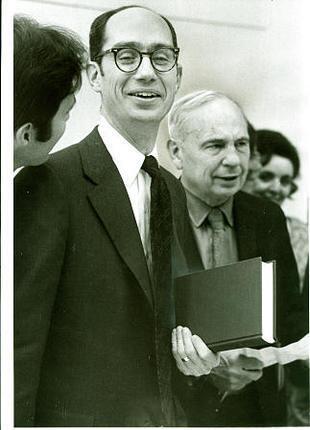
Henry B. Eyring and his father, Henry Eyring. Photo from Deseret News.
A story about his father, from "Write Upon My Heart":
In time, when the child is away from home and family, prayer can provide the shield of protection the parent will want so much for them to have. Parting can be hard, particularly when the parent and the child know that they may not see each other for a long time. I had that experience with my father. We parted on a street corner in New York City. He had come there for his work. I was there on my way to another place. We both knew that I probably would never return to live with my parents under the same roof again.
It was a sunny day, around noontime, the streets crowded with cars and pedestrians. On that particular corner there was a traffic light which stopped the cars and the people in all directions for a few minutes. The light changed to red; the cars stopped. The crowd of pedestrians hurried off the curbs, moving every way, including diagonally, across the intersection.
The time had come for parting, and I started across the street. I stopped almost in the center, with people rushing by me. I turned to look back. Instead of moving off in the crowd, my father was still standing on the corner looking at me. To me he seemed lonely and perhaps a little sad. I wanted to go back to him, but I realized the light would change and so I turned and hurried on.
Years later I talked to him about that moment. He told me that I had misread his face. He said he was not sad; he was concerned. He had seen me look back, as if I were a little boy, uncertain and looking for assurance. He told me in those later years that the thought in his mind had been: Will he be all right? Have I taught him enough? Is he prepared for whatever may lie ahead?
There were more than thoughts in his mind. I knew from having watched him that he had feelings in his heart. He yearned for me to be protected, to be safe. I had heard and felt that yearning in his prayers, and even more in the prayers of my mother, for all the years I had lived with them. I had learned from that, and I remembered.
Dieter F. Uchtdorf
Second counselor in the First Presidency
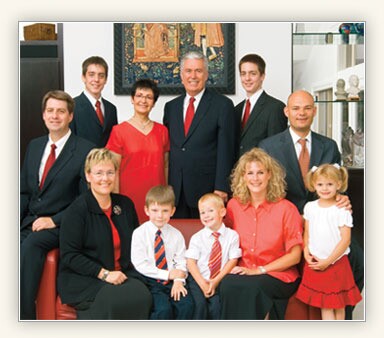
Uchtdorf family photo. Photo from LDS.org.
In the words of his children, from "Elder Dieter F. Uchtdorf: On to New Horizons":
“Although our father was extremely busy, we knew we were his highest priority,” Antje continues. “When he was home, he was totally devoted to Mom and to us. Of course, everything is exciting to Mom, and Dad makes things exciting. He made everything an adventure—even going to the grocery store. They took us on some of the most exciting family vacations a child could imagine. So as children we were pretty much in a state of excitement one way or the other all the time!”
For all that excitement (the children and their mother thought that their amateur photographer father and husband always got much too close to the lions in Africa), Antje particularly remembers the quiet times with her father. “Whether it was during his favorite pastime of looking up at the stars, or sledding together in the winter, or just sitting on the porch, my father was always teaching,” she says. “He loves the gospel, and he was always helping us to love it.”
“I don’t remember any sermons,” says Guido. “I just remember him always being interested in me. We had ‘visits,’ which were often walks in the evening and, on more special occasions, hikes in the mountains. I loved those times to talk. And in all such situations he taught by example. I used to travel to distant wards or branches with him when he was stake president, and I was his home teaching companion when I held the Aaronic Priesthood. That is how I learned about the priesthood and other responsibilities I would face—firsthand, shoulder to shoulder, father to son.”
Boyd K. Packer
President of the Quorum of the Twelve Apostles
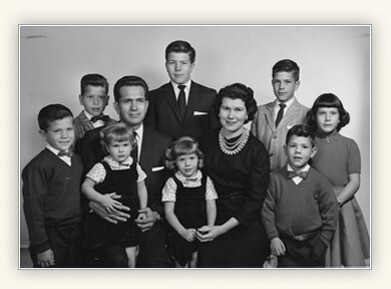
Packer family photo. Photo from LDS.org.
A story from young fatherhood, from "The Father and the Family":
I learned from a little boy the identity and value of a human soul. Some years ago, two of our little boys were wrestling on the rug. They had reached that pitch where laughter turns to tears. I worked a foot gently between them and lifted the older boy (then just four) to a sitting position on the rug, saying, “Hey, there, you monkeys, you’d better settle down.”
He folded his little arms and looked at me with surprising seriousness. His little boy feelings had been hurt, and he protested, “I not a monkey, Daddy, I a person.”
I was overwhelmed with love for him. I realized he was a child of God. How much I wanted him to be “a person”—one of eternal worth. From such ordinary experiences, I have learned to understand doctrine. “Children,” truly, “are an heritage of the Lord.”
L. Tom Perry
Quorum of the Twelve Apostles
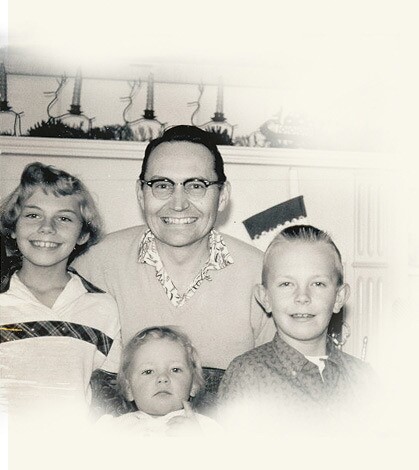
L. Tom Perry with his children. Photo from LDS.org.
A story from his family life, from "Called of God":
My children taught me a great lesson many years ago. Our family had moved from California to New York, where I had accepted a position with a new company. We began the process of finding a new home by looking in communities closest to the city. Gradually, however, we moved farther away from the city to find a home in a neighborhood that suited our needs. We found a beautiful home some distance from New York City. It was a one-story house nestled in the lovely deep woods of Connecticut. The final test before purchasing the home was for me to ride the commuter train into New York and check the time and see how long the commute would take. I made the trip and returned quite discouraged. The trip was one and one-half hours each way. I walked into our motel room where our family was waiting for me and presented to my children a choice.
“You can have either this house or a father,” I said. Much to my surprise they responded, “We will take the house. You are never around much anyway.” I was devastated. What my children were telling me was true. I needed to repent fast. My children needed a father who was home more. Eventually we reached a compromise and bought a home closer to the city, with a much shorter commute. I changed my work habits to allow me to have more time with my family.
In the words of his son, Lee, from "What Are Prophets?":
Tom Perry made spending time with his family, which included his wife Virginia and three children, a real priority. Elder Perry involved his family in his Church activities whenever possible. Over the years they typed and proofread talks, made copies for him, found quotes and stories, and served as timekeepers.
His son, Lee, spoke of the times he accompanied his father as a timekeeper on speaking assignments while his father was a high councilor in the Sacramento area.
“He would give me his watch, and I would sit in the center of the congregation, a few rows from the front. We used the signs of the three monkeys—see no evil, hear no evil, and speak no evil. If he wasn’t standing straight, I would cover my eyes. If he was speaking too loudly, I would cover my ears, and just before his time was up, I would cover my mouth,” Lee said.
Russell M. Nelson
Quorum of the Twelve Apostles
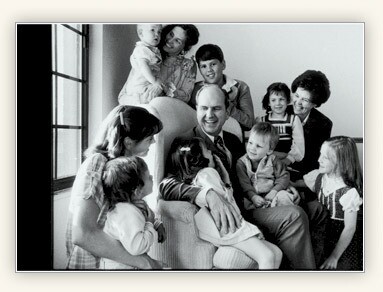
Nelson family laughing together. Photo from LDS.org.
A story of grandfatherly love, from "A New Harvest Time":
Family love is wonderful. Nothing is as specific as the love of a baby for its mother. Nothing is as predictable as the love of children for their parents or the love of parents for their children.
Recently I was tenderly hugging one of our precious little five-year-old granddaughters and said to her, “I love you, sweetheart.”
She responded rather blandly: “I know.”
I asked, “How do you know that I love you?”
“Because! You’re my grandfather!”
That was reason enough for her. Indeed, we do love our grandchildren. We also love our grandparents. I cherish the memories of life with three of my four grandparents. I never met my Grandfather Nelson. He died when my father was only 16 years old. At the time of Grandfather’s passing, he was superintendent of public instruction for the state of Utah. He owned a handsome pocket watch, which my father later gave to me. Now that watch is a tangible link between us.
I think of my Grandfather Nelson with deep feelings of gratitude. I received much of my early education in schools he helped to develop.
A story of priorities in parenthood, from "Living By Scriptural Guidance":
Time for scripture study requires a schedule that will be honored. Otherwise, blessings that matter most will be at the mercy of things that matter least. Time for family scripture study may be difficult to establish. Years ago when our children were at home, they attended different grades in several schools. Their daddy had to be at the hospital no later than 7:00 in the morning. In family council we determined that our best time for scripture study was 6:00 A.M. At that hour our little ones were very sleepy but supportive. Occasionally we had to awaken one when a turn came to read. I would be less than honest with you if I conveyed the impression that our family scripture time was a howling success. Occasionally it was more howling than successful. But we did not give up.
Now, a generation later, our children are all married with families of their own. Sister Nelson and I have watched them enjoy family scripture study in their own homes. Their efforts are much more successful than were ours. We shudder to think what might have happened if we had quit trying.
Dallin H. Oaks
Quorum of the Twelve Apostles
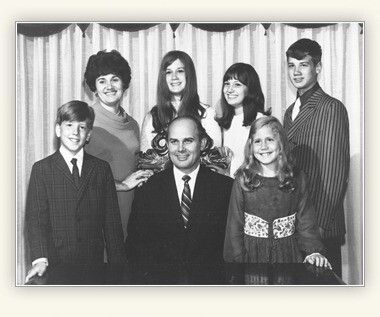
Oaks family photo. Photo from LDS.org.
A recollection of his father, from "Powerful Ideas":
We all have our own examples of the power of love. More than twenty-five years ago I recorded some memories I had of my father, who died before I was eight years old. What I wrote then illustrates the power of love in the life of a boy:
“The strongest impression I have of my relationship with my father I cannot document with any event or any words I can recall. It is a feeling. Based on words and actions long since lost to mind, this feeling persists with all the clarity of perfect faith. He loved me and he was proud of me. … That is the kind of memory a boy can treasure, and also a man”
M. Russell Ballard
Quorum of the Twelve Apostles
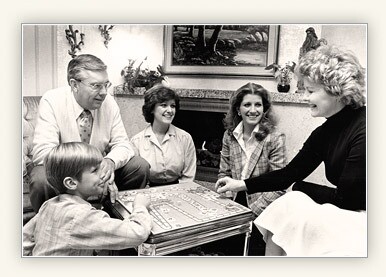
Ballard family home evening game. Photo from LDS.org.
In the words of his daughters Holly and Tammy, from "Elder M. Russell Ballard: True to the Faith":
“He has always been understanding,” says his daughter Holly. “The day I got my driver’s license, he let me borrow his beautiful Buick Electra. I was returning a sweater to the store for him. When I parked the car, I scraped its side.
“I was shaking when I called my dad, afraid that he’d be upset. He just laughed and told me it was only a car and no big deal. He was so understanding. He always seemed to know when we needed an arm around us.”
His daughter Tammy had a similar experience. “When I was in second grade, he was always bringing home a different used car, because of the business. One Sunday he had a yellow Cadillac with a white roof, and my friends and I jumped in the car to get a ride home from dad. We started jumping around in the car and a friend kicked the gear shift into neutral. The car rolled back and hit another car. My friends fled, and I panicked.
“I ran and told mom, and we went home. When we pulled up the garage door, the yellow Cadillac was there. My friends and I had jumped into another man’s car and wrecked it. I thought dad would be upset. But when he got home, he scooped me up in his arms and told me he was proud of me for telling the truth, then he took care of it and never mentioned it again. I really learned a lot from my father.”
Richard G. Scott
Quorum of the Twelve Apostles
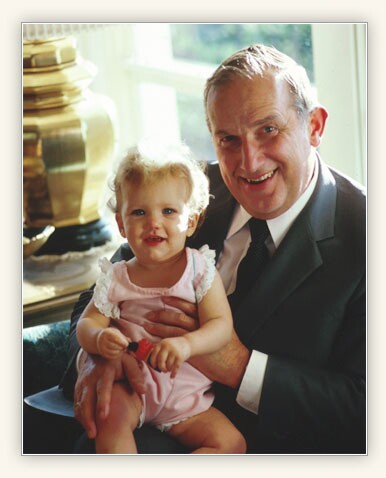
Elder Scott with a granddaughter. Photo from LDS.org.
A memory from young fatherhood, from "The Eternal Blessings of Marriage":
Once I learned an important lesson from my wife. I traveled extensively in my profession. I had been gone almost two weeks and returned home one Saturday morning. I had four hours before I needed to attend another meeting. I noticed that our little washing machine had broken down and my wife was washing the clothes by hand. I began to fix the machine.
Jeanene came by and said, “Rich, what are you doing?”
I said, “I’m repairing the washing machine so you don’t have to do this by hand.”
She said, “No. Go play with the children.”
I said, “I can play with the children anytime. I want to help you.”
Then she said, “Richard, please go play with the children.”
When she spoke to me that authoritatively, I obeyed.
I had a marvelous time with our children. We chased each other around and rolled in the fall leaves. Later I went to my meeting. I probably would have forgotten that experience were it not for the lesson that she wanted me to learn.
The next morning about 4:00 a.m., I was awakened as I felt two little arms around my neck, a kiss on the cheek, and these words whispered in my ear, which I will never forget: “Dad, I love you. You are my best friend.”
If you are having that kind of experience in your family, you are having one of the supernal joys of life.
Robert D. Hales
Quorum of the Twelve Apostles
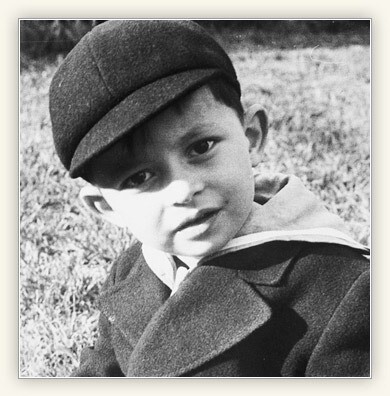
Robert D. Hales, around the age he would have been in the story he tells below. Photo from LDS.org.
Memories of his father, from "How Will Our Children Rememer Us?":
Father was a commercial artist for a large advertising agency in New York City. On one occasion he was under tremendous stress to produce an advertising campaign. He had come home on a Friday evening and worked most of the night. Saturday morning, after a few hours working in the yard, he retired to his studio to create an advertising campaign for a new product. My sister and I found great delight in chasing each other round and round the dining room table, which was situated in a room directly over his head. He had told us to please stop at least twice, but to no avail. This time he came bounding up the steps and collared me. He sat me down and taught a great lesson. He did not yell or strike me even though he was very annoyed.
He explained the creative process, the spiritual process, if you will, and the need for quiet pondering and getting close to the Spirit for his creativity to function. Because he took time to explain and help me understand, I learned a lesson that has been put to use almost daily in my life.
My point in telling these stories is that we, as parents, have the privilege and the responsibility of teaching gospel principles by our example and testimony to our loved ones.
My father has been gone for seven years, but I remember him with love and respect. Examples become memories that guide our lives:
• Memories of Mother and her tiny, slippered feet on top of Father’s feet as they danced around the kitchen and their expressions of love for each other.
• Memories as a young boy sitting on the floor by Mother and Father’s bedside while they took turns reading aloud from the scriptures.
• Memories in later years of going to the Salt Lake Temple and watching Mother and Father participate in the presentation of the endowment ceremony.
May the memories our children have guide their lives.
Jeffrey R. Holland
Quorum of the Twelve Apostles
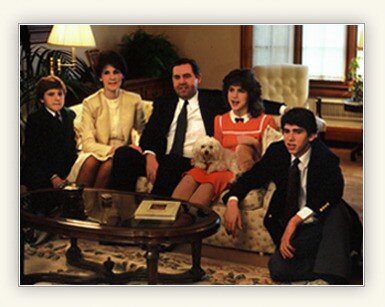
Holland family portrait. Photo from LDS.org.
A touching story of tempers and patience from young fatherhood, from "Within the Clasp of Your Arms":
Early in our married life my young family and I were laboring through graduate school at a university in New England. Pat was the Relief Society president in our ward, and I was serving in our stake presidency. I was going to school full-time and teaching half-time. We had two small children then, with little money and lots of pressures. In fact, our life was about like yours.
One evening I came home from long hours at school, feeling the proverbial weight of the world on my shoulders. Everything seemed to be especially demanding and discouraging and dark. I wondered if the dawn would ever come. Then, as I walked into our small student apartment, there was an unusual silence in the room.
“What’s the trouble?” I asked.
“Matthew has something he wants to tell you,” Pat said.
“Matt, what do you have to tell me?” He was quietly playing with his toys in the corner of the room, trying very hard not to hear me. “Matt,” I said a little louder, “do you have something to tell me?”
He stopped playing, but for a moment didn’t look up. Then these two enormous, tear-filled brown eyes turned toward me, and with the pain only a five-year-old can know, he said, “I didn’t mind Mommy tonight, and I spoke back to her.” With that he burst into tears, and his entire little body shook with grief. A childish indiscretion had been noted, a painful confession had been offered, the growth of a five-year-old was continuing, and loving reconciliation could have been wonderfully underway.
Everything might have been just terrific—except for me. If you can imagine such an idiotic thing, I lost my temper. It wasn’t that I lost it with Matt—it was with a hundred and one other things on my mind; but he didn’t know that, and I wasn’t disciplined enough to admit it. He got the whole load of bricks.
I told him how disappointed I was and how much more I thought I could have expected from him. I sounded like the parental pygmy I was. Then I did what I had never done before in his life—I told him that he was to go straight to bed and that I would not be in to say his prayers with him or to tell him a bedtime story. Muffling his sobs, he obediently went to his bedside, where he knelt—alone—to say his prayers. Then he stained his little pillow with tears his father should have been wiping away.
If you think the silence upon my arrival was heavy, you should have felt it now. Pat did not say a word. She didn’t have to. I felt terrible!
Later, as we knelt by our own bed, my feeble prayer for blessings upon my family fell back on my ears with a horrible, hollow ring. I wanted to get up off my knees right then and go to Matt and ask his forgiveness, but he was long since peacefully asleep.
My relief was not so soon coming; but finally I fell asleep and began to dream, which I seldom do. I dreamed Matt and I were packing two cars for a move. For some reason his mother and baby sister were not present. As we finished I turned to him and said, “Okay, Matt, you drive one car and I’ll drive the other.”
This five-year-old very obediently crawled up on the seat and tried to grasp the massive steering wheel. I walked over to the other car and started the motor. As I began to pull away, I looked to see how my son was doing. He was trying—oh, how he was trying. He tried to reach the pedals, but he couldn’t. He was also turning knobs and pushing buttons, trying to start the motor. He could scarcely be seen over the dashboard, but there staring out at me again were those same immense, tear-filled, beautiful brown eyes. As I pulled away, he cried out, “Daddy, don’t leave me. I don’t know how to do it. I am too little.” And I drove away.
A short time later, driving down that desert road in my dream, I suddenly realized in one stark, horrifying moment what I had done. I slammed my car to a stop, threw open the door, and started to run as fast as I could. I left car, keys, belongings, and all—and I ran. The pavement was so hot it burned my feet, and tears blinded my straining effort to see this child somewhere on the horizon. I kept running, praying, pleading to be forgiven and to find my boy safe and secure.
As I rounded a curve nearly ready to drop from physical and emotional exhaustion, I saw the unfamiliar car I had left Matt to drive. It was pulled carefully off to the side of the road, and he was laughing and playing nearby. An older man was with him, playing and responding to his games. Matt saw me and cried out something like, “Hi, Dad. We’re having fun.” Obviously he had already forgiven and forgotten my terrible transgression against him.
But I dreaded the older man’s gaze, which followed my every move. I tried to say “Thank you,” but his eyes were filled with sorrow and disappointment. I muttered an awkward apology and the stranger said simply, “You should not have left him alone to do this difficult thing. It would not have been asked of you.”
With that, the dream ended, and I shot upright in bed. My pillow was now stained, whether with perspiration or tears I do not know. I threw off the covers and ran to the little metal camp cot that was my son’s bed. There on my knees and through my tears I cradled him in my arms and spoke to him while he slept. I told him that every dad makes mistakes but that they don’t mean to. I told him it wasn’t his fault I had had a bad day. I told him that when boys are five or fifteen, dads sometimes forget and think they are fifty. I told him that I wanted him to be a small boy for a long, long time, because all too soon he would grow up and be a man and wouldn’t be playing on the floor with his toys when I came home. I told him that I loved him and his mother and his sister more than anything in the world and that whatever challenges we had in life we would face them together. I told him that never again would I withhold my affection or my forgiveness from him, and never, I prayed, would he withhold them from me. I told him I was honored to be his father and that I would try with all my heart to be worthy of such a great responsibility.
Well, I have not proven to be the perfect father I vowed to be that night and a thousand nights before and since.
David A. Bednar
Quorum of the Twelve Apostles
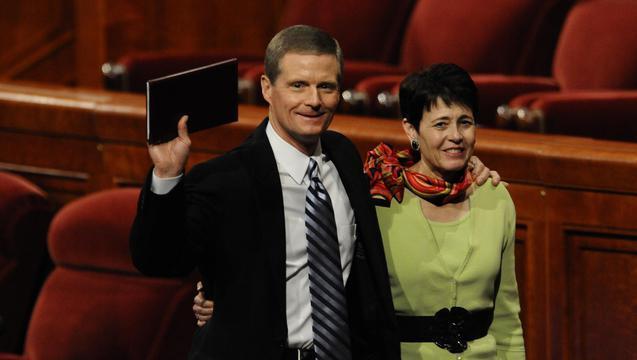
Elder and Sister Bednar. Photo from Mormon Newsroom.
A memory of his father, from "The Powers of Heaven":
I was reared in a home with a faithful mother and a wonderful father. My mom was a descendant of pioneers who sacrificed everything for the Church and kingdom of God. My dad was not a member of our Church and, as a young man, had desired to become a Catholic priest. Ultimately, he elected not to attend theological seminary and instead pursued a career as a tool and die maker.
For much of his married life, my father attended meetings of The Church of Jesus Christ of Latter-day Saints with our family. In fact, many of the people in our ward had no idea that my dad was not a member of the Church. He played on and coached our ward softball team, helped with Scout activities, and supported my mother in her various callings and responsibilities. I want to tell you about one of the great lessons I learned from my father about priesthood authority and power.
As a boy I asked my dad many times each week when he was going to be baptized. He responded lovingly but firmly each time I pestered him: “David, I am not going to join the Church for your mother, for you, or for anyone else. I will join the Church when I know it is the right thing to do.”
I believe I was in my early teenage years when the following conversation occurred with my father. We had just returned home from attending our Sunday meetings together, and I asked my dad when he was going to be baptized. He smiled and said, “You are the one always asking me about being baptized. Today I have a question for you.” I quickly and excitedly concluded that now we were making progress!
My dad continued, “David, your church teaches that the priesthood was taken from the earth anciently and has been restored by heavenly messengers to the Prophet Joseph Smith, right?” I replied that his statement was correct. Then he said, “Here is my question. Each week in priesthood meeting I listen to the bishop and the other priesthood leaders remind, beg, and plead with the men to do their home teaching and to perform their priesthood duties. If your church truly has the restored priesthood of God, why are so many of the men in your church no different about doing their religious duty than the men in my church?” My young mind immediately went completely blank. I had no adequate answer for my dad.
I believe my father was wrong to judge the validity of our Church’s claim to divine authority by the shortcomings of the men with whom he associated in our ward. But embedded in his question to me was a correct assumption that men who bear God’s holy priesthood should be different from other men. Men who hold the priesthood are not inherently better than other men, but they should act differently. Men who hold the priesthood should not only receive priesthood authority but also become worthy and faithful conduits of God’s power. “Be ye clean that bear the vessels of the Lord” (D&C 38:42).
I have never forgotten the lessons about priesthood authority and power I learned from my father, a good man not of our faith, who expected more from men who claimed to bear God’s priesthood. That Sunday afternoon conversation with my dad many years ago produced in me a desire to be a “good boy.” I did not want to be a poor example and a stumbling block to my father’s progress in learning about the restored gospel. I simply wanted to be a good boy. The Lord needs all of us as bearers of His authority to be honorable, virtuous, and good boys at all times and in all places.
You may be interested to know that a number of years later, my father was baptized. And at the appropriate times, I had the opportunity to confer upon him the Aaronic and the Melchizedek Priesthoods. One of the great experiences of my life was observing my dad receive the authority and, ultimately, the power of the priesthood.
Quentin L. Cook
Quorum of the Twelve Apostles
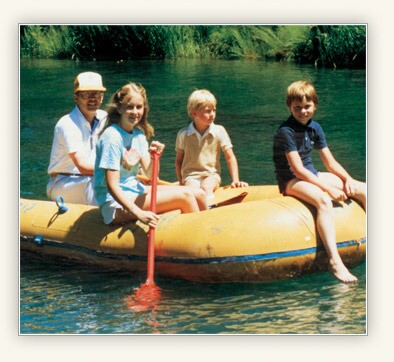
Cook family river rafting together. Photo from LDS.org.
A story of young family life, from "Rejoice":
When our children were small, my wife, Mary, and I decided to follow a tradition which my father taught when I was a child. He would meet with us individually to help us set goals in various aspects of our lives and then teach us how Church, school, and extracurricular activities would help us achieve those goals. He had three rules:
1. We needed to have worthwhile goals.
2. We could change our goals at any time.
3. Whatever goal we chose, we had to diligently work towards it.
Having been the beneficiary of this tradition, I had the desire to engage in this practice with my children. When our son, Larry, was five years old, I asked him what he wanted to be when he grew up. He said he wanted to be a doctor like his Uncle Joe. Larry had experienced a serious operation and had acquired great respect for doctors, especially his Uncle Joe. I proceeded to tell Larry how all the worthwhile things he was doing would help prepare him to be a doctor.
Several months later, I asked him again what he would like to be. This time he said he wanted to be an airline pilot. Changing the goal was fine, so I proceeded to explain how his various activities would help him achieve this goal. Almost as an afterthought I said, “Larry, last time we talked you wanted to be a doctor. What has changed your mind?” He answered, “I still like the idea of being a doctor, but I have noticed that Uncle Joe works on Saturday mornings, and I wouldn’t want to miss Saturday Morning Cartoons.”
Since that time our family has labeled a distraction from a worthwhile goal as a Saturday Morning Cartoon.
D. Todd Christofferson
Quorum of the Twelve Apostles
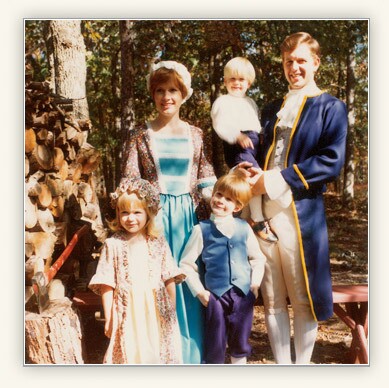
Christofferson family role playing history together. Photo from LDS.org.
A memory of his father, from "Let Us Be Men":
Years ago, when my brothers and I were boys, our mother had radical cancer surgery. She came very close to death. Much of the tissue in her neck and shoulder had to be removed, and for a long time it was very painful for her to use her right arm.
One morning about a year after the surgery, my father took Mother to an appliance store and asked the manager to show her how to use a machine he had for ironing clothes. The machine was called an Ironrite. It was operated from a chair by pressing pedals with one’s knees to lower a padded roller against a heated metal surface and turn the roller, feeding in shirts, pants, dresses, and other articles. You can see that this would make ironing (of which there was a great deal in our family of five boys) much easier, especially for a woman with limited use of her arm. Mother was shocked when Dad told the manager they would buy the machine and then paid cash for it. Despite my father’s good income as a veterinarian, Mother’s surgery and medications had left them in a difficult financial situation.
On the way home, my mother was upset: “How can we afford it? Where did the money come from? How will we get along now?” Finally Dad told her that he had gone without lunches for nearly a year to save enough money. “Now when you iron,” he said, “you won’t have to stop and go into the bedroom and cry until the pain in your arm stops.” She didn’t know he knew about that. I was not aware of my father’s sacrifice and act of love for my mother at the time, but now that I know, I say to myself, “There is a man.”
Neil L. Andersen
Quorum of the Twelve Apostles
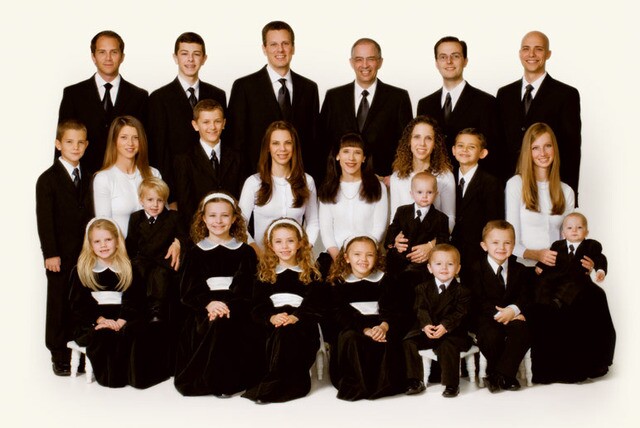
Andersen family portrait (children and grandchildren). Photo from LDS.org.
In the words of his children, from "Elder Neil L. Andersen: Man of Faith":
The Andersens’ oldest daughter, Camey Hadlock, says, “Daddy [an endearing term still used by his sons and daughters] always made time for the children. For example, he took each one individually to breakfast with him once a month. He let us pick the place for breakfast and the topics we would talk about. We looked so forward to having his undivided attention.”
Derek Andersen remembers his dad making time to play: “Growing up, we loved playing basketball as a family. He’d come home from work, and we’d team up against my older brother and play basketball together.”
Daughter Kristen Ebert recalls that even though her father was extremely busy, “he always had time to listen and to give sound advice.”
The Andersens were so faithful in having family scripture study and singing a hymn each night that the children would do it alone if their parents returned home late.
For family home evening, the Andersens would often study the conference talks in the Ensign. “It was clear that when the prophet spoke, we listened,” Derek says.
